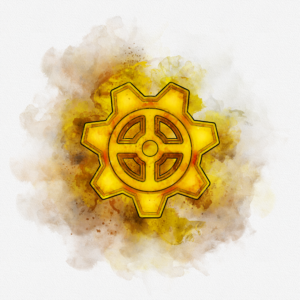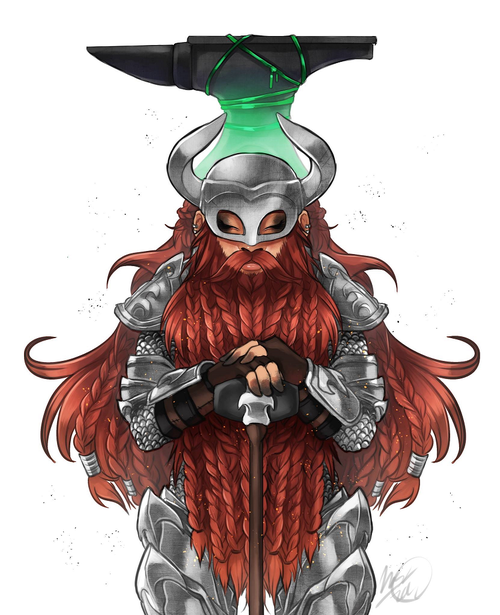Magnora
Titles: The Forge, the Grand Crafter
Domain: Creation, Invention
Symbol: A seven toothed gear
Sphere Granted: Light
Magnora is the patron goddess of craft and ingenuity. Dedicated to her work, she is skilled in all physical arts whether wrought in steel, wood, clay or cloth. Magnora constantly seeks to improve both the form and efficiency of her work. Her methods are her own, her skill born from her divine nature. Only the most devout may learn her secrets.
Unlike her counterpart, Celeste, all that Magnora creates must have purpose. Fine swords have fine edges, her needlepoint creates sturdy clothes, her lavish meals are hearty and healthy, and her sculptures serve as support beams or housewares. Her one foray into the creation of beauty alone, Celeste, led to heartache. Learning from her mistake, Magnora works in the balance of form and function where even mundane objects, like barrels and nails, are honoured for their utility alongside admirable armour and woven cloth.
Appearance
Magnora appears to mortals as a beautiful dwarf with a long red beard braided and hanging to the ground. When not in her Dwarven form, she often appears as a scarred and statuesque Einish woman. In both forms she wears mithril full plate, crafted in her own forge. She’s often seen wielding a smith’s silver hammer, magically enchanted to craft any mundane item with a single strike, or destroy any item, including artifacts or those created via ritual magics.
Tenets
Five things a follower of Magnora should do:
1. Strive to improve your craft in every way. Only through hard work can one evolve.
2. Help your fellow craftsmen however you can. Stunting their growth solves nothing.
3. Competition is important. Without a burning passion to do better, progress stalls.
4. Your craft should improve those around you. Make things that improve your home, family and society.
5. Function over form. The time spent on your work should be predominantly dedicated to its quality, not its appearance.
Five things a follower of Magnora should not do:
1. Be lazy with your work or cut corners.
2. Hinder the progress of another’s work.
3. Give up on a craft or project. It is more important to try and fail and learn from your mistakes, so that the next craft succeeds.
4. Destroy exceptional crafts or works, or allow others to do so. Only destroy work to build something better.
5. Craft life.
History
Magnora was stolen from the golden nest of the Savage Gods by her brother, Sverin. She was gifted to his hyena brethren and spirited away deep inside the mountains of Gerdain. When she broke free from her shell and was born into this world, she found herself alone. This loneliness ate away at her. She tried to fill this void by utilizing the great forge she had found deep within the dwarven halls, but no amount of craftsmanship could ease her pain. After a brief visit from her estranged father, Valdr, she was given a powerful rune of creation in exchange for crafting him a magical hammer. This gave Magnora the tools she needed to work a solution. She fashioned inspiration, creativity, life, and beauty from the world around her. Using her own ingenuity and life from the creation rune, she brought her mate to life, expecting her reward to be happiness ever after. The fates had other things in mind. While Magnora was capable of creating life, she was unable to command its love. The beautiful and androgynous Celeste was born, but soon wished to leave their master’s workshop to explore the world and inspire mortals – without Magnora.
Magnora was left, once again, alone and heartbroken. She cast the rune of creation into her forge, destroying it forever. As it burned out, so too did the fires of love in her heart and she vowed never to be swayed by beauty or to create life again.
Celestial Heaven: The Great Forge
Magnora’s Celestial Heaven was, at one point in history, much larger than it currently is. Where once Magnora held dominion over the Great Forge and all of the land around it for leagues and leagues, now she only claims the mountain itself and all that lies underground. In years past, Magnora turned the surface into a beautiful garden so that her greatest creation, the God Celeste, would have a divine realm of their own. When Celeste rejected their creator to instead explore all of existence and the beauty within it, Magnora resolved that neither she nor any that served her would ever look upon Celeste or any of their works ever again. In a single day, Magnora raised a great wall encircling the Great Forge. The Great Wall is both utterly indestructible and bends space in such a fashion that travelling over or even seeing across its battlements is quite impossible. There is but one passage through the wall, a singular door that only opens outwards from Celeste’s Heaven. As of yet, it has never been used.
The surface has been given over to Celeste and forbidden to Mangora’s worshipers upon pain of obliteration should they violate her command. Thus, the fallen supplicants of Magnora are called to the Great Forge, a craggy mountain of truly awe-inspiring size and bulk. The mountain and the ground beneath it have been nearly completely hollowed out into the shape of a vast dome. The only light that is cast within the Great Forge extends from a large pillar of flowing magma in the center of the room or from the countless workstations that are strewn about the cavern in a fastidious and orderly fashion. Rows upon rows of shelving are filled to the brim with both raw supplies and finished products, ferried back and forth at a hurried pace by an army of golems operating ingenious little carts with spring-loaded lifts. Nearly every craft imaginable is worked upon here. Blacksmiths forge the tools that the carpenters use to build the furniture everyone else rests upon, while glassblowers craft the ablemics that the Forge’s numerous alchemists require.
No matter where one might be standing within this circular room, the pillar of magma always appears to be located behind a massive workstation of astounding complexity. This is where Magnora can nearly always be seen to be working at something. She rarely acknowledges the others working around her and largely remains focused on her own work. Once in a blue moon, something will catch her eye long enough for her to look up from her workstation, and her worshipers figuratively live for the moments when she might offer an approving nod or a helpful comment.
Realms Within The Great Forge
- The Skyseat
Situated at the very peak of her domain, Magnora’s unadorned throne room used to overlook the vast fields and forests that stretched out in all directions from her mountain home. Now, all one can see when they sit upon her throne are the bricks of her great wall. Even then, Magnora rarely deigns to sit upon her spartan throne, for she has found that the sight of the wall only further reminds her of what she cannot see and of what she cannot have. When her work finally does overwhelm her and she can no longer set aside thoughts of Celeste in her labours, she retires here so that none can see her as she weeps.
- The Trade Colleges
While all who ascend to Magnora’s Realm exalt the act of creation above all else, not everyone wants to be a Blacksmith for all eternity. Magnora created the various Trade Colleges so that when a Spirit tired of their craft, there was a system in place to retrain them into a new profession. The greatest minds amongst her Spirits and her Angels teach practical lessons and skills, and the quality of their instruction and the facilities provided are near without equal. Nearly any trade, craft, or profession can be learned here if it involves the act of creation in some fashion.
It is rumoured that the most gifted students of the Colleges have created wonders that have never been seen elsewhere. Cannons small enough to be held by a single person, machines that soar through the air like birds, and alchemical solutions that can turn mere water into liquid gold. These formulas are locked away in Magnora’s most secure vault, and while she admires the ingenuity of those that make these discoveries, she will not permit them to be released outside her domain. Arthos simply isn’t ready for them.
- Halls of Libations
While Magnora is most commonly associated with blacksmiths and those craftsfolk that produce tangible, long-lasting goods with their hands, not all who follow her are obsessed with forging perfectly balanced axes or erecting unassailable structures. A small yet significant minority of her supplicants in her Heaven instead gather at the Halls of Libations, where they brew some of the finest alcohols in all of the Celestial realms. While their brews are perhaps not quite as fancy and those supped upon by those used to the finer things in life, none who sample them can deny their quality and taste. A multitude of underground farms supplies the brewers with nearly every ingredient imaginable, including many that most of her worshipers had neither seen nor even heard about in their living days. As such, the Halls tend to be a popular spot with those Spirits looking to unwind a little after a hard day’s work.



